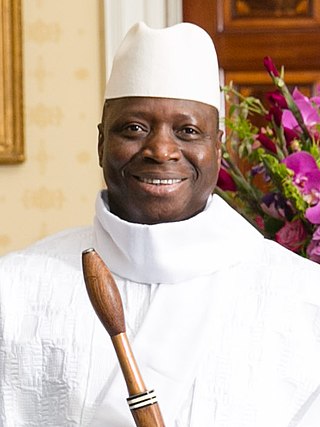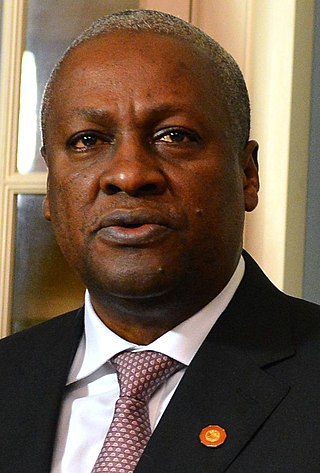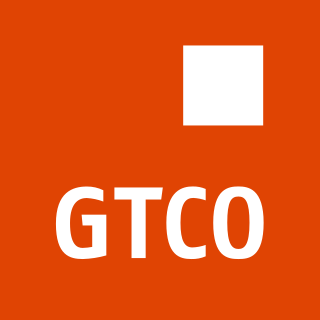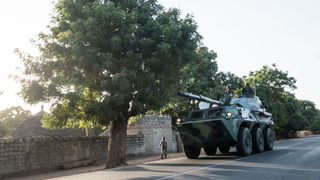Contents
| |||||
| Decades: | |||||
|---|---|---|---|---|---|
| See also: | |||||
Events in the year 2021 in the Gambia .
| |||||
| Decades: | |||||
|---|---|---|---|---|---|
| See also: | |||||
Events in the year 2021 in the Gambia .
Ongoing — COVID-19 pandemic in the Gambia

Senegal, officially the Republic of Senegal, is the westernmost country in West Africa, situated on the Atlantic Ocean coastline. Senegal is bordered by Mauritania to the north, Mali to the east, Guinea to the southeast and Guinea-Bissau to the southwest. Senegal nearly surrounds The Gambia, a country occupying a narrow sliver of land along the banks of the Gambia River, which separates Senegal's southern region of Casamance from the rest of the country. Senegal also shares a maritime border with Cape Verde. Senegal's economic and political capital is Dakar.

The Gambia, officially the Republic of The Gambia, is a country in West Africa. Geographically, The Gambia is the smallest country in continental Africa; it is surrounded by Senegal on all sides except for the western part, which is bordered by the Atlantic Ocean.

Politics of The Gambia takes place within the framework of a presidential republic, whereby the President of The Gambia is both head of state and head of government, and of a multi-party system. Executive power is exercised by the government. Legislative power is vested in both the government and parliaments.

The first written records of the region come from Arab traders in the 9th and 10th centuries. In medieval times, the region was dominated by the Trans-Saharan trade and was ruled by the Mali Empire. In the 16th century, the region came to be ruled by the Songhai Empire. The first Europeans to visit the Gambia River were the Portuguese in the 15th century, in 1447, who attempted to settle on the river banks, but no settlement of significant size was established. Descendants of the Portuguese settlers remained until the 18th century. In the late 16th century, English merchants attempted to begin a trade with the Gambia, reporting that it was "a river of secret trade and riches concealed by the Portuguese."

The Gambia followed a formal policy of non-alignment throughout most of former President Dawda Jawara's tenure. It maintained close relations with the United Kingdom, Senegal, and other African countries. The July 1994 coup strained The Gambia's relationship with Western powers, particularly the United States. Starting in 1995, President Yahya Jammeh established diplomatic relations with several additional countries, including Libya, the Republic of China, and Cuba. As scholars on Gambia's foreign policy have argued, throughout Jammeh's period, the country's foreign policy was a shifting sand, with little of direction.

Yahya Abdul-Aziz Jemus Junkung Jammeh is a Gambian politician and former military officer, who served as President of the Gambia from 1996 to 2017, as well as Chairman of the Armed Forces Provisional Ruling Council from 1994 to 1996.

The Gambia elects on national level a head of state – the president – and a legislature. The president is elected for a five-year term by the people. The National Assembly has 53 members, 48 members elected for a five-year term and 5 members appointed.

John Dramani Mahama is a Ghanaian politician who served as President of Ghana from 24 July 2012 to 7 January 2017. He previously served as Vice President of Ghana from January 2009 to July 2012, and took office as president on 24 July 2012, following the death of his predecessor, John Evans Fiifi Attah Mills.
The University of Melbourne Student Union (UMSU) is one of two student organisations at the University of Melbourne, Australia. UMSU, incorporated as University of Melbourne Student Union, Inc. (UMSU) provides representation and services for all current students and the University of Melbourne.

Guaranty Trust Holding Company PLC also known as GTCO PLC is a multinational financial services group, that offers retail and investment banking, pension management, asset management and payments services, headquartered in Victoria Island, Lagos, Nigeria. GTCO Plc was created in July 2021 following the corporate reorganization of Guaranty Trust Bank PLC into a Holding Company.
The University of the Gambia (UTG) is an institution of higher education located in Sere Kunda, the largest city in the Gambia.

Adama Barrow is a Gambian politician and real estate developer who has served as President of the Gambia since 2017.

A constitutional crisis occurred in Gambia following presidential elections in December 2016, in which challenger Adama Barrow achieved an upset victory over longtime incumbent Yahya Jammeh. It eventually concluded after a military intervention by the Economic Community of West African States (ECOWAS) led to Jammeh’s departure from the country.

The ECOWAS military intervention in the Gambia or the ECOWAS Mission in The Gambia – initially code-named Operation Restore Democracy – is a military intervention in The Gambia by several member states of the Economic Community of West African States.

Aja Fatoumata C.M. Jallow-Tambajang is a Gambian politician and activist who served as Vice-President of the Gambia and Minister of Women's Affairs from February 2017 to June 2018, under President Adama Barrow.
The COVID-19 pandemic in The Gambia was a part of the worldwide pandemic of coronavirus disease 2019 caused by severe acute respiratory syndrome coronavirus 2. The virus was confirmed to have reached The Gambia in March 2020.

Presidential elections were held in the Gambia on 4 December 2021. The result was a victory for incumbent President Adama Barrow of the National People's Party, who received 53% of the vote, defeating five other candidates.
This is a list of events in 2021 in West Africa.
The 1991 Katsina State gubernatorial election occurred on 14 December 1991. NRC candidate Saidu Barda won the election, defeating SDP Umaru Musa Yar'Adua.
The First Lady of the Gambia is the official title of the wife of the President or Head of State of The Gambia. Since January 19, 2017, Fatoumatta Bah-Barrow has been First Lady.